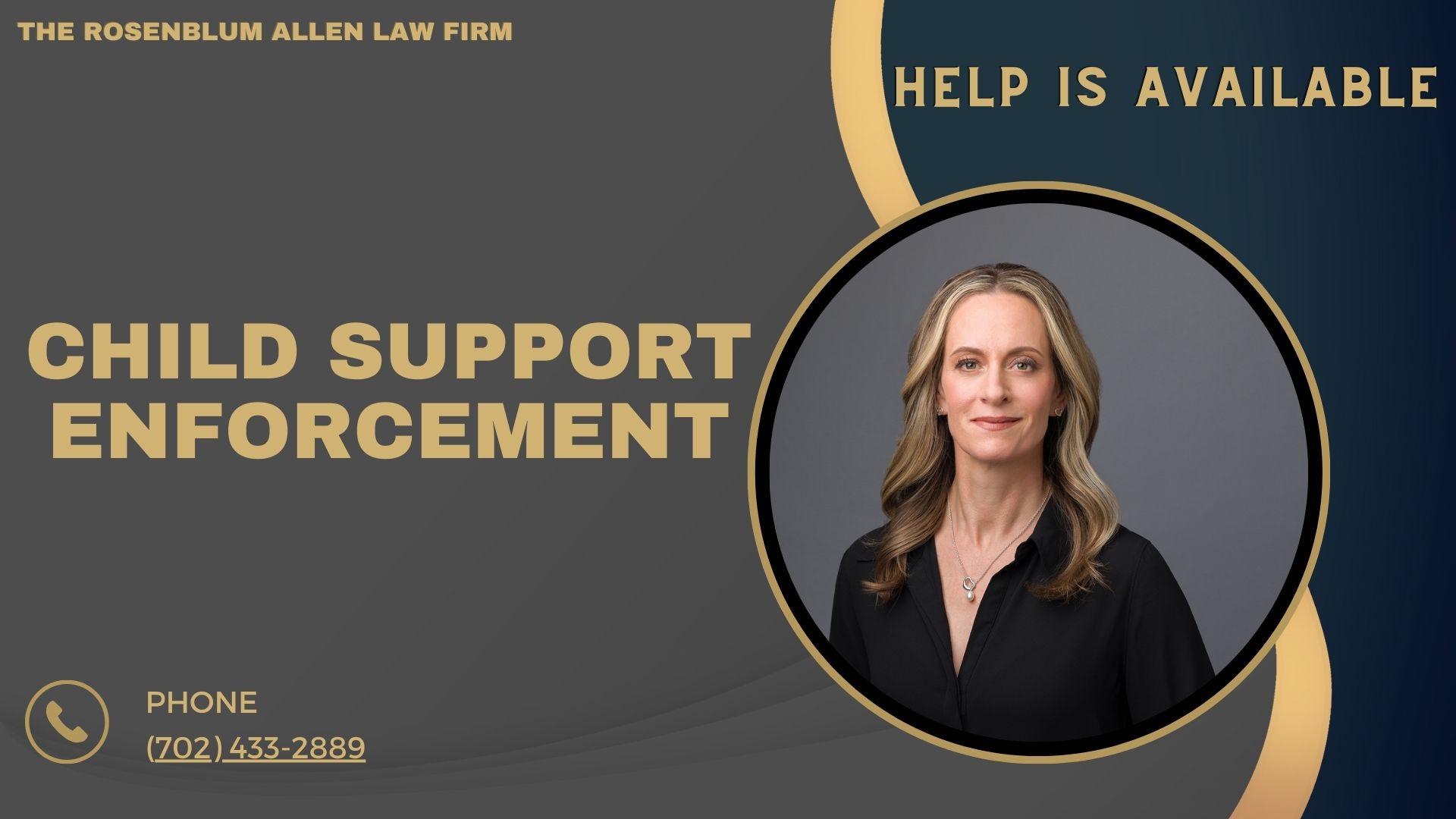Child support enforcement plays a vital role in ensuring that children receive the financial support they need from both parents. It’s about ensuring that when a court orders child support, the parent responsible for paying it follows through. But what happens when payments are late, partial, or stop altogether? This is where enforcement comes in.
For parents facing difficulties with unpaid child support, knowing the legal options and steps available can help them regain control of the situation and secure the support owed to their children.
Understanding Child Support Enforcement
Child support enforcement refers to the legal methods used to ensure that a parent pays the required amount of child support. When someone fails to meet their child support obligations, enforcement measures can be taken to recover the unpaid amount.
Enforcement is critical because missed payments can place a significant financial burden on the parent, who is left to cover the child’s expenses alone. Whether the costs are small or large, consistent support ensures the child’s needs are met.
Child Support Enforcement: Key Legal Options and Procedures
Child support enforcement plays a vital role in ensuring that children receive the financial support they need from both parents. It’s about ensuring that when a court orders child support, the parent responsible for paying it follows through. But what happens when payments are late, partial, or stop altogether? This is where enforcement comes in.
For parents facing difficulties with unpaid child support, knowing the legal options and steps available can help them regain control of the situation and secure the support owed to their children.
Child support enforcement refers to the legal methods used to ensure that a parent pays the required amount of child support. When someone fails to meet their child support obligations, enforcement measures can be taken to recover the unpaid amount.
Enforcement is critical because missed payments can place a significant financial burden on the parent, who is left to cover the child’s expenses alone. Whether the costs are small or large, consistent support ensures the child’s needs are met.
Legal Tools for Child Support Enforcement
Wage Garnishment
One of the most common tools for enforcing child support is wage garnishment. This process automatically deducts child support payments directly from the non-paying parent’s paycheck.
How wages are garnished for child support
Wage garnishment works by sending an order to the parent’s employer. A portion of their paycheck is then withheld and sent directly to the child support enforcement agency or the custodial parent. This ensures that payments are made regularly, without the non-paying parent having control over whether to send them.
Employer responsibilities in wage garnishment
Employers are legally obligated to comply with wage garnishment orders. If they fail to do so, they may face penalties. The withheld funds are then sent to the appropriate state agency or the custodial parent, depending on how the system is set up in that jurisdiction.
Tax Refund Interception
If wage garnishment isn’t enough, another method is intercepting federal or state tax refunds from the non-paying parent. This approach can help recover past-due support.
Process for intercepting tax refunds
Tax refund interception happens when the non-paying parent files their taxes. If they are due a refund, the state child support agency can seize it to cover the unpaid support. The intercepted funds are sent to the custodial parent to make up for missed payments.
How tax refund interception is initiated
The custodial parent doesn’t need to do anything to start this process; the state’s child support agency handles it. However, the agency will generally notify both parents that the interception will occur, giving the non-paying parent a chance to dispute if they believe the enforcement is incorrect.

License Suspension
When a parent falls behind on child support, they can lose essential privileges. One of the most impactful consequences is license suspension.
Types of licenses that can be suspended
Several types of licenses can be suspended as a form of child support enforcement. These include:
- Driver’s licenses – Losing the ability to drive can make daily life much more difficult.
- Professional licenses – This affects jobs that require licensing, like doctors, lawyers, and contractors.
- Hunting and fishing licenses – Recreational permits may also be targeted, especially in states where outdoor activities are popular.
Effects of license suspension on compliance
Losing a license can be a wake-up call for the non-paying parent. It can have an immediate impact on their lifestyle and motivate them to resolve the unpaid child support. In many cases, a parent must pay a portion or all of their overdue support to get their licenses back. This method can be highly effective when wage garnishment or other enforcement tools haven’t worked.
Contempt of Court
Failing to follow a court’s child support order can lead to serious consequences, one of the most significant being being held in contempt of court.
Legal consequences for ignoring court orders
When a parent is found in contempt, the court may impose penalties such as:
- Fines can add up quickly, making it more expensive to avoid paying support.
- Community service – A parent might be required to serve several hours.
- Jail time – In more extreme cases, a judge can order the non-paying parent to spend time in jail.
Possible outcomes from contempt hearings
Contempt hearings give the non-paying parent one last chance to explain why they haven’t paid. If they are found in contempt, the penalties vary based on the severity of the case. Some parents may avoid jail time by agreeing to a payment plan or paying a lump sum toward the overdue support.
Judges don’t often want to jail a parent because it could make paying support even harder. But they will use it as a last resort if it seems the only way to enforce compliance.
Government Agencies Involved in Child Support Enforcement
Role of State Child Support Agencies
Each state has a dedicated agency to help enforce child support orders. These agencies:
- Work with parents to set up and enforce child support orders.
- Help track down non-paying parents who have moved
- Use tools like wage garnishment and tax refund interception.
Parents struggling to collect child support can contact their local child support office for help. Most enforcement actions described in this article, such as wage garnishment or tax refund interception, are initiated through the state agency.
How state agencies help enforce support
State agencies typically manage child support payments by collecting them from the non-paying parent and sending them to the custodial parent. They track missed payments and initiate enforcement actions when necessary. These agencies also provide services such as modifying support orders when circumstances change.
Collaboration with federal authorities
In cases where a non-paying parent crosses state lines, state agencies work with the federal government to enforce child support. This cooperation helps ensure that no matter where the parent moves, they remain accountable for their financial obligations.
Office of Child Support Enforcement (OCSE)
Federal oversight and support to state agencies
The Office of Child Support Enforcement (OCSE) is a federal agency that coordinates child support enforcement efforts across the country. The OCSE provides resources and guidance to state child support agencies and monitors states to ensure they are following federal child support laws.
Services offered by OCSE for parents
For parents, the OCSE website offers helpful tools, including:
- Child support calculators can help estimate how much support may be required.
- Case information portals – Parents can track payments and enforcement actions through online portals in many states.
- Educational resources – Guides on how child support is calculated and enforced.
While OCSE does not directly enforce payments, its oversight and resources make it easier for states to do so effectively.

What to Do if You’re Not Receiving Child Support
If child support payments stop or are irregular, it can create natural financial stress. Fortunately, there are steps parents can take to get the support they’re owed. Here’s what to do if you find yourself in this situation.
Contacting Local Child Support Enforcement Agencies
The first thing a custodial parent can do is contact their local child support enforcement agency. These agencies are specifically set up to help parents enforce support orders. They handle everything from tracking down a non-paying parent to filing legal actions.
Information needed for case submission
To get the ball rolling, you’ll need to provide certain information:
- Your child support order (the official court document)
- Payment history (proof of missed or partial payments)
- The non-paying parent’s contact details, if known
Once you provide this, the agency will open a case and begin its enforcement actions.
Legal Steps to Enforce Child Support
If working with the child support enforcement agency doesn’t resolve the issue, you may need to turn to the courts.
Filing enforcement actions in court
In many cases, filing a motion in court can push enforcement further. This motion asks the court to enforce the child support order through more severe consequences like wage garnishment or contempt of court.
While this process can take time, getting a parent to comply is often necessary. Your local family court will provide forms, but you can also work with a lawyer if you need help with how to proceed.
Hiring an attorney for additional assistance
Sometimes, it makes sense to hire a family law attorney. An attorney can help you navigate the legal system and ensure the non-paying parent faces the proper enforcement measures. Working with a lawyer speeds up the process and provides peace of mind for many parents.
Consequences of Non-Payment of Child Support
When a parent fails to pay child support, the consequences go beyond falling behind on bills. Legal and financial penalties can pile up, making it increasingly more work for the non-paying parent to avoid responsibility.
Financial Penalties
Falling behind on child support can lead to several financial consequences, including:
- Accumulation of arrears – Missed payments don’t just disappear. They accumulate over time and can grow into a large debt.
- Interest and fees – Many states charge interest on unpaid child support, increasing the total owed.
- Impact on credit rating – Unpaid child support can be reported to credit agencies, lowering the non-paying parent’s credit score.
Criminal Penalties
While the goal is to get the parent to pay, there are times when criminal penalties come into play.
Possible jail time for severe non-payment
In extreme cases, where a parent refuses to pay for an extended period, the court may sentence them to jail. This is typically reserved for situations where all other enforcement methods have failed. Jail time is often used as a last resort to pressure the non-paying parent into compliance.
Probation and alternative penalties
Instead of jail, some parents might face probation. This allows them to avoid jail but comes with strict rules, such as making regular payments and reporting to a probation officer. If they violate the terms, they could end up in jail.
Modifying Child Support Orders
Sometimes, circumstances change. A parent might lose their job, or the child’s needs might evolve. In such cases, requesting a modification of the child support order is possible. Modifications ensure that the support amount remains fair based on the current situation.
When a Child Support Order Can Be Modified
Certain situations allow for a change in the original support order. Here are the most common reasons:
- Change in financial circumstances
- If the paying parent experiences a significant change in income, such as job loss or a substantial salary cut, they may request a modification. On the other hand, if the custodial parent’s financial situation changes (for example, they get a high-paying job), the paying parent might request a reduction in support.
- Change in custody arrangements.
- If the custody arrangement changes, this can also affect child support. For example, if the non-custodial parent gains more custody time, they may request a lower payment amount to reflect the additional care they provide.
The Process of Requesting a Modification
Modifying a child support order isn’t automatic and requires legal action. Here’s how the process typically works:
Filing a petition for modification
The parent requesting the modification must file a formal petition with the court. This petition should explain the reason for the change and provide evidence, such as pay stubs or proof of job loss. The court will review the petition to decide whether a modification hearing is warranted.
The court’s review process
Once the petition is filed, the court will hold a hearing to review the evidence and determine whether a change is justified. Both parents will have the opportunity to present their case. The judge will then decide whether to modify the child support order and by how much.
Temporary vs. Permanent Modifications
It’s important to understand that modifications can be temporary or permanent.
- Temporary modifications
- If the financial hardship is short-term (such as a temporary layoff), the court may grant a temporary reduction in child support. Once the situation improves, payments may return to the original amount.
- Permanent modifications
- The court may issue a permanent modification to the child support order for long-term circumstances. This is more common when there has been a significant, ongoing change, such as a permanent job loss or a substantial change in the child’s needs.

Role of the Courts in Child Support Enforcement
Courts play a critical role in enforcing child support orders. When other enforcement methods fail, the court system can step in to ensure that child support payments are made.
How the Courts Enforce Child Support
Courts have broad powers to enforce child support orders. If a parent is not paying, the custodial parent can file a motion to enforce the support order in family court. The court will then take various actions to ensure compliance.
Everyday enforcement actions taken by courts
Courts may use several strategies to get a non-paying parent to comply:
- Wage garnishment – This can be ordered directly through the court if it hasn’t already been initiated.
- Contempt of court – A judge can hold the non-paying parent in contempt, leading to fines or jail time.
- Liens on property – The court can place a lien on the non-paying parent’s property, including homes or vehicles, to secure the debt owed.
- Seizure of assets – In extreme cases, the court can seize bank accounts or other assets to recover unpaid support.
When to Involve the Courts
Parents often wonder when it’s time to take the issue to court. If informal enforcement methods (like working with local agencies) have failed and payments still need to be received, filing a motion in court may be necessary.
Filing a motion for enforcement
A parent must file a motion to enforce the support order to start the court process. This motion outlines the missed payments and requests the court take specific actions to collect the support. It’s typically best to gather documentation, such as payment records, to support the case.
Attending a hearing
Once a motion is filed, the court will schedule a hearing. Both parents will attend, and the judge will listen to both sides before deciding what enforcement actions should be taken. The parent who owes support will have an opportunity to explain why they haven’t paid, but the court’s priority is ensuring the child receives financial support.
How to Avoid Child Support Enforcement Actions
No parent wants to face enforcement actions. Avoiding these measures is simple: follow the child support order and communicate openly if there’s a problem. However, life’s circumstances can change, and knowing how to avoid severe consequences is essential.
Staying Current on Payments
The easiest way to avoid enforcement actions is to make regular payments. Even if the total amount can’t be paid, making partial payments and communicating with the custodial parent or child support agency can go a long way.
Setting up automatic payments
Many states offer automatic payment services that deduct child support directly from a bank account. This can help ensure payments are made on time and reduce the risk of enforcement actions.
Communicating changes in financial circumstances
If a job loss or other financial difficulty occurs, the non-paying parent should communicate this change immediately. It’s far better to be proactive than to let payments fall behind without explanation. In many cases, a temporary modification can be requested to adjust the payment amount.
Modifying the Support Order Before Falling Behind
Rather than waiting until payments are missed, parents should request a modification if they foresee difficulties. Courts are more likely to work with parents who take action early rather than those who avoid the issue.

Breaking It All Down
Child support enforcement ensures children receive the financial support they deserve, even when a parent refuses to pay. Various tools, from wage garnishment to license suspension, can be used to enforce payments and hold non-paying parents accountable.
Knowing the available legal options and understanding how the enforcement process works is crucial for parents who are struggling to receive support. For non-paying parents, it’s important to take action early and seek modifications if needed rather than facing the steep consequences of enforcement.
In any case, the court system and child support enforcement agencies are in place to ensure that every child gets the support they need to thrive.

Frequently Asked Questions
What happens if child support payments are missed?
When a parent misses child support payments, enforcement actions can be taken. These include wage garnishment, tax refund interception, license suspension, and even jail time in extreme cases.
Can child support orders be modified?
Yes, if circumstances significantly change, such as a loss of income or a change in custody, a parent can request a modification of the support order through the courts.
What should I do if I am not receiving child support?
Contact your local child support enforcement agency to report missed payments. They can assist with enforcing the order through various methods, such as wage garnishment or property liens.
How long does child support enforcement take?
The time it takes depends on the method used and the cooperation of both parties. Some enforcement actions, like wage garnishment, can be implemented quickly, while others, such as legal proceedings, may take longer.
Can I go to jail for not paying child support?
If a parent continuously fails to make child support payments, a court can order jail time as a last resort. However, this usually happens after other enforcement methods have failed.
What if the other parent moves to another state?
Thanks to federal laws like the Uniform Interstate Family Support Act (UIFSA), child support enforcement is still possible across state lines. Local agencies work together to enforce payments, regardless of where the non-paying parent lives.
How can I avoid child support enforcement actions?
The best way to avoid enforcement actions is to stay current on payments. If you need help, communicate with the court or agency and request a modification rather than allowing payments to fall behind.

Additional Resources for You
Don’t forget that our lead attorney, Molly Rosenblum Allen, Esq., has also created these additional resources to assist you in your time of need:
Child Support Modification: Need to modify your child support arrangement? Find guidance and resources here: Child Support Modification.
Does My New Spouse’s Income Count for Child Support?: Wondering if your new spouse’s income affects child support payments? Get clarity here: Does My New Spouse’s Income Count for Child Support?.
How to Get Child Support Arrears Dismissed: Dealing with child support arrears? Learn how to navigate this process effectively: How to Get Child Support Arrears Dismissed.
Las Vegas Child Support: Explore comprehensive information and resources related to child support in Las Vegas: Las Vegas Child Support.
Who Has to Pay Child Support in Joint Custody?: Unsure about child support obligations in joint custody arrangements? Find answers here: Who Has to Pay Child Support in Joint Custody?.
Las Vegas Child Support Laws: Gain insights into the specific laws governing child support in Las Vegas: Las Vegas Child Support Laws.
These resources, crafted by our experienced attorney, aim to provide clarity and guidance on various aspects of child support and family law.

Outside Resources for You
FindLaw – Divorce: FindLaw offers comprehensive information on various aspects of divorce, including legal issues, processes, and resources for finding attorneys.
Nolo – Divorce & Family Law: Nolo provides valuable legal information and resources on divorce and family law topics, including articles, FAQs, and DIY divorce options.
American Bar Association (ABA) – Family Law: The ABA’s Family Law section provides resources, publications, and events related to family law matters, including divorce and child support.
Justia – Family Law: Justia’s Family Law section provides legal resources, articles, and case law related to family law matters, including divorce, child support, and custody.

A Special Message from Our Lead Attorney, Molly Rosenblum Allen, Esq

Thank you for exploring our resources! Please schedule a consultation with me if you have questions or need help. Call us at (702) 433-2889.
I am looking forward to helping you!
Best,
Molly Rosenblum Allen, Esq.




